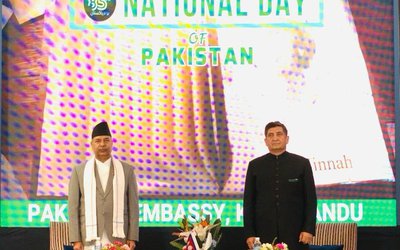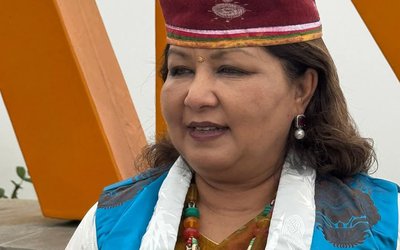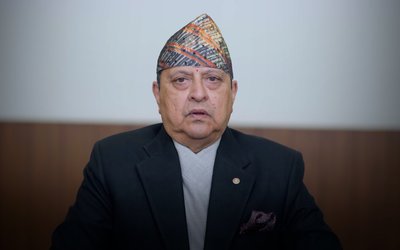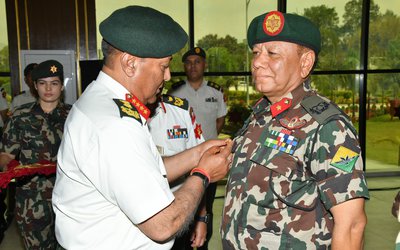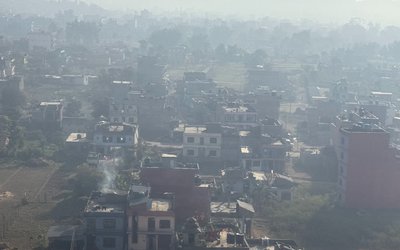
When a river washed Khimti village of Ramechhap one night recently, killing a couple of people, the first to reach the spot for rescue and relief were Nepal Army personnel.
This is not the first time. Whenever small or big disasters have occurred, like the Gurkha Earthquake, Nepal Army has remained the first force to call for effective rescue and relief. Although Nepal Army is in the forefront of rescue and relief in disasters, it also needs effective communication tools to issue early warnings.
As there is an increase in the annual extremes of climate events, Nepal Army needs to have effective communication tools. With a force of over 100,000 strong personnel, posted from east to west of the country and to many difficult peace keeping operations around the globe, Nepal Army also needs to have a way to communicate with its own family members.
Having no such facility on its own, Nepal Army’s peacekeepers have now to use other expensive and unreliable tools to communicate with their family. With an FM Station of its own, Nepal Army can convey the voice message to their family from civil war-torn places around the world where its personnel are stationed.
Currently, Indian Army and British Army have been using the radio to disseminate the message of their family members living in Nepal.
Given the importance for internal communication, Nepal Army recently applied for an FM station. Soon after Nepal Army submitted the application to the Ministry of Information and Communication, a group questioned the intention of such application.
In different countries of the world like United Sates, United Kingdom, India, Pakistan and Sri Lanka, all the armies have their own radio broadcasting, which aim to serve the interest of military’s own family.
The American Forces Network (AFN) is the broadcast service operated by the United States Armed Forces' American Forces Radio and Television Service (AFRTS) for its entertainment and command internal information networks worldwide. The AFN worldwide radio and television broadcast network serves American servicemen and women, Department of Defense and other U.S. government civilians and their families stationed at bases overseas, as well as U.S. Navy ships at sea.
British Forces Broadcasting Service: The British Forces Broadcasting Service (BFBS) provides radio and television programs for British Armed Forces, and their dependents worldwide. Editorial control is independent of the Ministry of Defense and the armed forces themselves. It was established by the British War Office (now the Ministry of Defense) in 1943.
Originally known as the Forces Broadcasting Service (FBS), it was initially under the control of the British Army Welfare Service, with its first effort, the Middle East Broadcasting Unit, with its headquarters in Cairo.
The Pakistan army has a radio station - FM 96 was set up to counter militant propaganda in the Swat Valley, but it is now expanding its broadcasts into the semi-autonomous tribal belt.
Given all these international norms and practices, Nepal Army has submitted application as per the National Broadcasting Act 1992 clause 6.This provision does not bar Nepal Army to seek a radio license.
Nepal Army is not the first institution to seek FM license. However, Traffic Police has been running its own FM Station to disseminate the traffic related news and other information.
Nepal Army, in a press statement, expressed the concern over the current media criticism against its decision to apply for FM station. “As a responsible and professional army committed to Nepal’s independence and sovereignty, Nepal Army has no intention other than to serve nation and people,” said the press release. “We need an FM station to maintain communication with our family and disseminate information related to Nepal Army, disaster management and early warning.”
With a history of abiding professionalism and direction of the government, Nepal Army’s FM station will be purely for its own internal communication and at the time of disaster.
Studies have shown that Nepal is one of the most vulnerable countries in terms of water induced disasters and earthquakes. As a forefront organization in disasters, FM Radio station of Nepal Army can benefit all Nepalese.
- NEPAL-THAILAND: Joint Business Council
- Apr 13, 2025
- BIMSTEC SUMMIT: Nepal’s Stand
- Apr 11, 2025
- IME GROUP: Expands Into Paper Industry
- Mar 24, 2025
- CPN UML: Instigated By India
- Mar 23, 2025
- ADB’S CHIEF ECONOMIST: Nepal Reduces Poverty
- Mar 11, 2025

